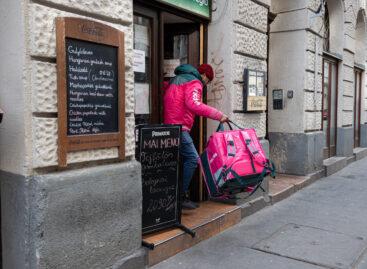The domestic food chain must be further strengthened
It is an important objective that the interests of all actors in the food chain can prevail, be it the agricultural producer, food processor, wholesaler and retailer, or the final consumer – said Dr. Márton Nobilis, State Secretary of the Ministry of Agriculture responsible for the food industry and trade policy, at the Joint Venture Association (Economy Brunch) Forum in Budapest.

(Photo: Istvan Fekete)
The state secretary spoke about food inflation and emphasized that it is expected to decrease in the coming months. Thanks to the measures taken by the government so far, including the reduction in utilities up to average consumption and the price caps, Hungarian families can be protected from significant additional expenses. The goal is to reduce inflation to single digits by the end of the year. Dr. Márton Nobilis reminded that the Economic Competition Authority started investigating the food retail market sector in January. In order to explore this, the first accelerated sectoral inspections were launched on the market of milk and milk products, followed by vegetables and fruits. Among the government measures, Márton Nobilis highlighted the HUF 290 billion support of the Széchenyi Card program, which enables Hungarian small entrepreneurs to get a favorable loan at an interest rate of 5 percent. The fact that the interest rate cap has been extended to the loans of small and medium-sized companies, which affects HUF 2,000 billion in loans and helps 60,000 businesses, is an additional help for the actors of the sector, he added.
A working group helps the operation of food businesses
He emphasized that the Ministry of Agriculture is still committed to increasing self-sufficiency and ensuring that high-quality, affordable Hungarian products, fresh and healthy food are placed on store shelves and on the tables of Hungarian families. The State Secretary also mentioned that Nébih has developed its “No Residue” program to reduce the generation of food waste. The campaign’s four professional working groups compiled guides and aids that can serve as a yardstick for food businesses in preventing and mitigating the generation of food waste. Márton Nobilis also drew attention to the support of convenience stores in terms of security of supply and population retention in small rural settlements. Small shops operating in settlements with less than 2,000 people could apply for subsidies of HUF 1-3 million, while butcher shops operating as micro-enterprises could receive government assistance of a maximum of HUF 3.5 million.
AM
Related news
Service charge is not a tip – here’s the difference between the two
There is often great uncertainty as to whether the service…
Read more >AM: the Szupermenta product test program provides additional information for purchase
The National Food Chain Safety Office (Nébih) Szupermenta product test…
Read more >GVH President: “the priority task of the national competition authority is to protect the interests of Hungarian consumers”
Csaba Balázs Rigó gave a presentation at the December meeting…
Read more >Related news
After a subdued year, the holiday season is strong
74% of online shoppers, around 3.1 million people, are preparing…
Read more >Lidl has published its 3rd sustainability report
Lidl Hungary’s sustainability report for the 2022/2023 business years has…
Read more >Battle of the regions: these are the most popular dishes according to Hungarians
Five times the national average of Mexican food is consumed…
Read more >








